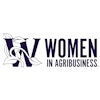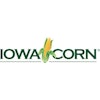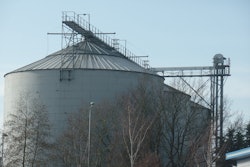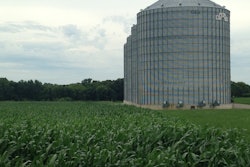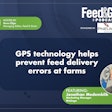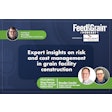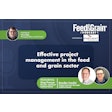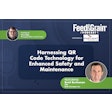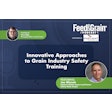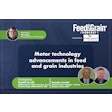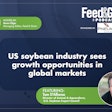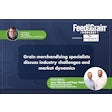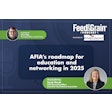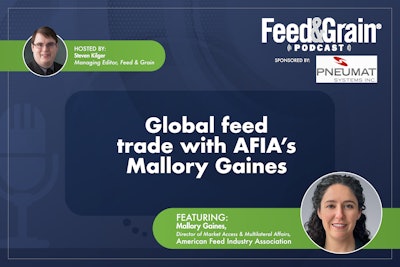
Join Steven Kilger, host of the Feed & Grain Podcast, as he delves into the complexities of the feed manufacturing, grain handling and allied industries. In this episode, Steven sits down with Mallory Gaines, Director of Market Access & Multilateral Affairs for the American Feed Industry Association (AFIA), to explore the dynamic landscape of international feed ingredient trade.
Discover the challenges and opportunities faced by the feed industry, particularly in the U.S., as they navigate trade regulations and market access. Mallory shares valuable insights into the current trends in international feed trade, highlighting key markets such as China, Vietnam, and the European Union. Learn about AFIA's efforts to advocate for feed exports, including their success story with China and the grant received from the U.S. Department of Agriculture (USDA).
Podcast Sponsored by Pneumat Systems.
Transcript has been edited for clarity.
Steven Kilger (0:00):
My name is Steven Kilger and I'm the Managing Editor of Feed & Grain magazine and the host of the Feed & Grain Podcast. Thank you so much for joining me today as we dive deep into the issues affecting the feed manufacturing, grain handling and allied industries. Today I'm talking to Mallory Gaines, Director of Market Access & Multilateral Affairs for the American Feed Industry Association (AFIA) about what's happening in international feed and feed ingredient trade.
Kilger (0:24):
But before that, I'm happy to announce, today’s episode is brought to you by The BinWhip from Pneumat Systems. The powerful Dual Impact BinWhip removes the toughest buildup and blockages in industrial storage silos — without hazardous silo entry. Learn more today at binwhip.com. Thank you, Pneumat Systems for sponsoring the show!
Kilger (0:43):
If you want to help out podcast and are listening in a podcasting app, please rate us and subscribe. If you're listening online, sign up for the Feed & Grain eNewsletter, Industry Watch, to see the latest podcasts and stay up to date with all the news from around the industry. Now, on to the show.
Kilger (0:58):
Hi, Mallory. Thanks so much for joining us on the podcast today.
Mallory Gaines (1:01):
Thank you. I'm excited to be here.
Kilger (1:03):
It's great having you. I really appreciate it. It's exciting time, New Year new us. It's good to see what's going on in the feed industry and especially the trade portion of it. But before we get into everything, can you tell us our listeners a little ... Oh, I always say "us" ... me and our listeners a little bit more about yourself and what you do with AFIA?
Gaines (1:25):
Happy to introduced myself to you and the listeners, Mallory Gaines with American Feed Industry Association, Director of Market Access and Multilateral Affairs. Here at AFIA, I do trade and market access. So I'm helping our members export and import their products as well as gain new market access into other countries and other regions of the world.
Kilger (1:47):
Excellent. Yeah, that's such important work to people don't realize how much just goes into everyday trade with countries.
Gaines (1:55):
Yeah, it's hard!
Kilger (1:56):
It really is. And very complicated. Can you provide kind of an overview of the landscape of international feed trade right now, at least from the U.S. perspective?
Gaines (2:06):
Yes, absolutely. Our exports in animal feed are continuing to get larger year to year, which is very exciting. And I will mention that from an AFIA perspective, I'm mainly looking at our feed additives and ingredients, all of those micronutrients that go in making up a complete feed versus some of the bulk commodities. So when I'm talking about trade, it's going to be a lot of on feed additives and ingredients. I don't think it's a surprise for folks to hear that one of our biggest competitors is the European Union. And when you do take away those corn and corn co-products, the EU is slightly more in their exports, then we are in the US.
Gaines (2:44):
Our top markets for feed additives, I think is very interesting. We have China, Mexico, Canada and South Korea. And China is kind of a new one, have we gained some market access there and are excited to have more access to that market and be shipping more over there. We also see an increase in those markets of their interest in feed additives, premix and compound feeds. So a lot of them that is the top commodity that's going into those countries. So I think that's a very exciting outlook for the feed industry in general. And shows that we are growing and can continue to grow and not to keep using the word grow. But our growth is outside the United States.
Kilger (3:23):
Yeah. Well, that is where the growth is right, especially in China and those developing markets, which are demanding more and more food. I imagine the differences between shipping products to the European Union vs. shipping products to China, that must be so different. How do the various countries and their regulatory framework impact international trade? What are the some of the challenges and opportunities to these policies present especially for businesses here in the United States?
Gaines (3:53):
Yes, different regulations and different policies can really create barriers to trade. I say there are barriers to trade ... and then there are barriers to trade. And it's very hard to increase market access, if you can't even say register your product in that country due to misguided regulations. So they massively impact feed exports. So from our perspective, feed additives and ingredients come in all different types. And often regulators want to set one regulation, say a level of contaminant that covers everything. And that just really doesn't work for feed additives and ingredients are added to different products. They're treated different ways. There's heat treatment, there's pressure treatment, there's all sorts of things that go into these ingredients. And when you just set an arbitrary level, you can really hinder business and access to that market.
Kilger (4:43):
I saw the other day that there was news at AFIA, you got a grant from the USDA to help advocate interest in feed exports. I think specifically with China, and maybe one other country that I don't remember, but how does AFIA promote that mission? How do they use that money to difference in accessing those markets.
Gaines (5:02):
Yes, that is a excellent question. And one I'm happy to answer. So U.S. Department of Agriculture has their market access program funding. AFIA is has been a cooperator of the program, which you have to be — that's their technical term for the last several years — and we have been focusing our efforts, actually in Vietnam with some China, I'd say. And Vietnam, because it is such a developing market, their economy continues to grow, their middle class continues to grow and their food production sector continues to grow. And by food production, I mean animal agriculture and aquaculture, which is the perfect sweet spot for AFIA. Because with that growing middle class, you have a lot of interest in pet food, actually, which is something we're doing in that sector, or in that country rather. And then also on the growing agriculture side, that's where we want to start to promote our feed additives and ingredients. So very excited about the funding.
Gaines (5:54):
For China, we've utilized that funding, and are continuing to utilize it to gain market access, we had a very hard time registering facilities in the past, and with the China phase one agreement, and with some of our funding and outreach, we were able to work with the Chinese government work with the U.S. government. And now that path forward is actually pretty clear. And we've been getting more and more food additives and ingredients on China's you know, quote-unquote, list. You can't see me making quotation marks, but quote-unquote, lists, so our folks can export. And they are such a wonderful success story where we utilized funding, advocacy and kind of all the tools in our toolbox to open up a market for our members.
Kilger (6:36):
Yeah. Anyways, we mentioned getting into those markets, which is a very specific region, area. Is it different when you try to go to say, then export to the European Union? Like, what do we do that's different for those type of markets than we do for these kinds of emerging markets in the east?
Gaines (6:55):
Yes, every market is different. The EU is a completely different vibe and regulatory system. They are a developed country. So we're really we have to meet the standards that they set in order to export to them. We are working actually in have been working with our counterpart of the EU, their association name is FEFAC. And we've been trying to get more access for feed additives and ingredients is working with FEFAC and working with our governments. I hope that that endeavor is successful, but it's something we are chipping away at because ultimately, the EU's perspective on regulations and how they set up the regulations is a little different from ours. You may be familiar with the term Precautionary Principle, which is something that the EU utilizes and we really don't in the United States. So it's something that we're constantly, I would say, kind of up against and having either to comply with in order to export or it is a big effort to try to adjust those regulations to be more of a US science based mindset..
Kilger (7:58):
Yeah, it's, it seems like ...
Gaines (8:00):
That's a whole other podcast.
Kilger (8:01):
I know, I know, I feel like we could make about a whole podcast could just be like Mexico's issue with GM. Right, so we'll have to have you on at some point there. Just write that down in my future podcast idea book. But, so here's something exciting, IPPE is is almost here. By the time people are listening to this. It'll be a few days away, but when we're recording this, it's about a week away. Are there any educational opportunities attendees should take advantage of at the show anything you're excited about, anything that you're doing or presenting in?
Gaines (8:33):
I'm very excited about IPPE and from a trade perspective, there are a couple. I have a couple suggestions for folks. One that doesn't always happen, but we will have the US Trade Representative Chief Agricultural Negotiator, Ambassador Doug McKalip and the US Department of Agriculture's Trade and Foreign Agriculture Affairs Undersecretary Alexis Taylor, both at IPPE. They are going to be doing a fireside chat moderated by AFIA CEO, Constance Cullman and that will be on Tuesday, January 30, at the Pet Food Conference, so I think that'll be a really neat experience. For those who are interested in trade. I mean, that'd be hearing it directly from the US government horse's mouth, so to speak. So that should be an exciting fireside chat is the term.
Gaines (9:22):
And then if I can, I'd also like to mention the next day Wednesday, I am hosting a meeting with the Animal Plant Health Inspection Service from USDA. We hosted this meeting last year, and this year it's going to be more policy focused. We actually have about 10 APHIS representatives from both their headquarters and field staff, which is almost unheard of to get all those folks together in a group. It's open not just to AFIA members, so open to folks of the show to meet them. We are going to have several topic tables for them to interact with those folks. I think that's going to be a really exciting and unique opportunity for industry and government to come together and collaborate.
Kilger (10:00):
So looking ahead, what do you see future trends or opportunities with international feed trade? Where do you think the biggest breakthroughs are going to come? And be reminded, you will be held accountable for this.
Gaines (10:11):
Okay. Great. Thank you. Yeah, it's Mallory's forecasting, I really want to see the industry and feed additives and ingredients manufacturers supporting developing markets, I think that we really can look probably further in the future than most people want to, at the African continent. I think of Nigeria, Kenya, Morocco, these are all countries that want to do better feed and food safety. They want to do better in agriculture. And I really see that feed additives and ingredients could support what they're currently doing — set themselves up to help them grow and really be inundated in that market early.
Gaines (10:47):
Of course, I'd be remiss if I didn't talk about Vietnam, again, we are very excited about Vietnam. The Vietnamese government wants to have foreign investment, they're very open to foreign investments. So now is really the time to be looking at Vietnam and how we can, again, feed additives and ingredients, and of course, pet food, support what they're doing there and get into that marketplace.
Gaines (11:08):
And Latin America can't forget Latin America, you know, that's a different marketplace, because many of those agriculture sectors are very well developed. So that's kind of a different way of looking at it. But how can feed additives and ingredients support a very well developed agriculture space, and add to what they're already doing, increase their feed efficiency.
Gaines (11:28):
I've not even touched on fun things like sustainability, which everybody is looking at — climate change. How can feed additives and ingredients get into those markets, to increase feed efficiency, to tell the story about how we upcycle our products, and utilize them in animal feed. And then of course, the products that also help with methane reduction is high on everybody's list. So there's a lot of opportunity out there. There's a lot of countries that have a need. And I think that those needs can be filled by feed additives and ingredients, which makes my job very exciting to help folks access those markets.
Kilger (12:04):
Yeah, definitely. And hopefully, we'll have you on again next year. Oh, even earlier than that for some of those topics we talked about.
Gaines (12:11):
Be happy to.
Kilger (12:12):
Well, thank you so much for joining me today. I really appreciate it as do our listeners and we're looking forward to everything that's gonna happen at IPPE next week.
Gaines (12:20):
Yeah, same here. Thank you.
Kilger (12:21):
All right. Bye.
.jpg?auto=format%2Ccompress&crop=faces&fit=crop&h=48&q=70&w=48)
